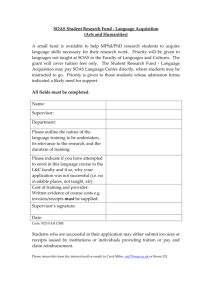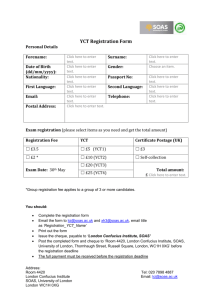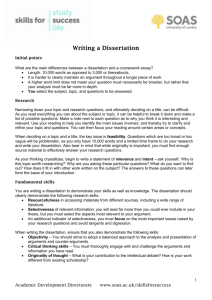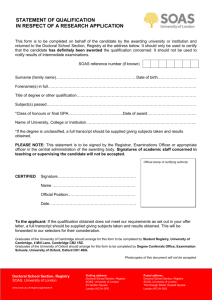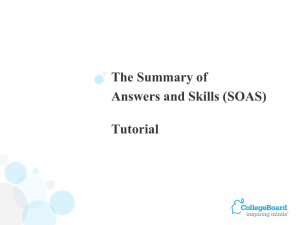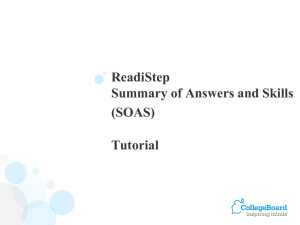Draft revised postgraduate programme specification
advertisement
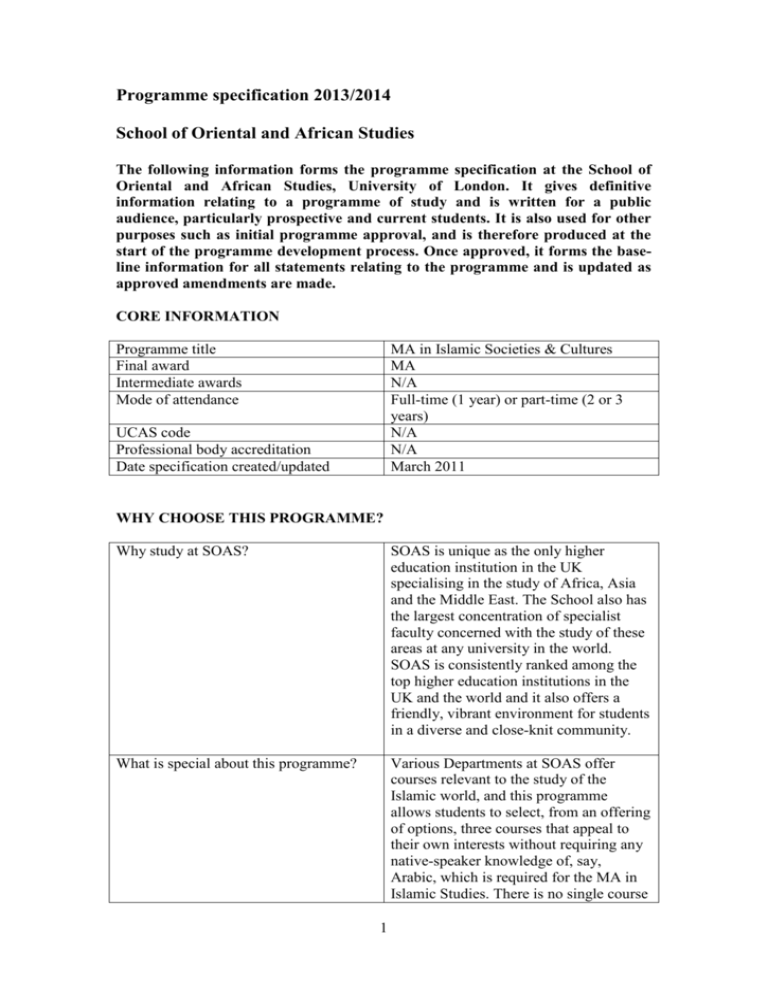
Programme specification 2013/2014 School of Oriental and African Studies The following information forms the programme specification at the School of Oriental and African Studies, University of London. It gives definitive information relating to a programme of study and is written for a public audience, particularly prospective and current students. It is also used for other purposes such as initial programme approval, and is therefore produced at the start of the programme development process. Once approved, it forms the baseline information for all statements relating to the programme and is updated as approved amendments are made. CORE INFORMATION Programme title Final award Intermediate awards Mode of attendance MA in Islamic Societies & Cultures MA N/A Full-time (1 year) or part-time (2 or 3 years) N/A N/A March 2011 UCAS code Professional body accreditation Date specification created/updated WHY CHOOSE THIS PROGRAMME? Why study at SOAS? SOAS is unique as the only higher education institution in the UK specialising in the study of Africa, Asia and the Middle East. The School also has the largest concentration of specialist faculty concerned with the study of these areas at any university in the world. SOAS is consistently ranked among the top higher education institutions in the UK and the world and it also offers a friendly, vibrant environment for students in a diverse and close-knit community. What is special about this programme? Various Departments at SOAS offer courses relevant to the study of the Islamic world, and this programme allows students to select, from an offering of options, three courses that appeal to their own interests without requiring any native-speaker knowledge of, say, Arabic, which is required for the MA in Islamic Studies. There is no single course 1 that has to be taken obligatorily, though certain restrictions apply as regards the choice of the Major option and as regards which combinations are permitted. Students can take advantage of the expertise that SOAS offers across its offerings of postgraduate courses. The main difference between this MA and the MA in Near and Middle Eastern Studies is that some courses available to this programme relate to the Islamic world beyond the Middle East. Anyone wishing to acquire an academic qualification in the Islamic world for a career in (for example): the media, civil service, journalism, aid-work, charitywork, NGO-work, banking, the law, etc. One option from List A is taken as the Major and two options from List B as the Minors. Students write a 10,000-word dissertation linked to their Major course. All SOAS courses include an element of coursework in the overall assessment, but the precise balance between exam and coursework (70/30, 60/40, 50/50) depends on the individual courses taken. Whom would it suit? Programme structure Assessment summary ENTRY REQUIREMENTS SOAS has general minimum entrance requirements for registration for a postgraduate taught degree and these can be viewed at http://www.soas.ac.uk/admissions/pg/howtoapply/ Students wishing to take certain options as their Major will normally be expected to have their 1st degree in that discipline. This applies to those wishing to have their Major in Social Anthropology, Economics, Politics (of the Middle East), and Law. PROGRAMME AIMS What will this programme give the student an opportunity to achieve? The programme aims at academic training in the study of Islam through a variety of disciplines, cultural contexts and periods. The programme aims at equipping students with an advanced level of understanding of disciplinary academic topics and issues regarding Islamic tradition, law and art, as well as the place of Islam in modern politics and alongside other religions. The programme aims at equipping students with the critical and analytical skill that enable them to conduct research on Islam on a solid methodological 2 and disciplinary basis. PROGRAMME LEARNING OUTCOMES What will the student learn? Learning outcomes will vary depending on the combination of courses chosen by individual students. Learning outcomes for each course can be found under the information provided on the relevant list of postgraduate courses on the departmental page of the SOAS website. In general, by the end of the course students will have learnt the following: Knowledge How to assess data and evidence critically from manuscripts and digital sources, solve problems of conflicting sources and conflicting interpretations, locate materials, use research-sources (particularly research-library catalogues) and other relevant traditional sources. Subject-specific skills are an amalgam of the skills described for each of the three options chosen by candidates from the cross-department/faculty choices available in the relevant course-descriptors. Intellectual (thinking) skills Students will learn to become precise and cautious in their assessment of evidence and should also come to understand through practice what documents can and cannot tell us. Students will learn to question interpretations, however authoritative, and reassess evidence for themselves. Communicate effectively in writing Subject-based practical skills Language-students will learn the chosen language at the appropriate level. Present seminar-papers Listen and discuss ideas introduced during seminars Practise research-techniques in a variety of specialised research-libraries and institutes Transferable skills Writing good essays and dissertations Structure and communicate ideas effectively, both orally and in writing Study a variety of written and digital materials in libraries and researchinstitutes of a kind they will not have used as undergraduates Present (non-assessed) material orally PROGRAMME STRUCTURE AND REQUIREMENTS FOR GAINING AN AWARD Structure, duration and requirements for gaining an award SOAS has standard requirements relating to the structure and duration of taught postgraduate programmes and for the award and classification of these programmes. 3 Details can be found at http://www.soas.ac.uk/registry/degreeregulations/file60379.pdf Programme structure diagram Students take three taught courses (one Major, two Minor) and write a 10,000 word dissertation. The dissertation is linked to the Major and supervised by the teacher of the Major subject. The Minors must be from a different discipline to that of the Major. Both Minors can be in the same discipline. Only one language-course can be chosen, and language-courses are only available as Minors. Students taking the course part-time over 2 years tend to take 2 units in their first year and the remaining unit and the dissertation in their second year. Students taking the course part-time over 3 years tend to take one course unit per year. Below is a structure diagram for this programme. Level 7 Year of study n/a Course code n/a 7 n/a n/a 7 n/a n/a 7 n/a n/a Course title Credit Status Major course from List A Minor course from List B Minor course from List B Dissertation 45 Compulsory 45 Minor option 1 Minor option 2 Compulsory 45 45 Notes linked to the Major course The availability of optional/elective courses may vary in a given academic session due to factors such as staff absence and student numbers. For an up to date list of courses running in a given academic session please refer to the degree structures as listed on the SOAS website for the degree programmes taught by each Department. List A: Major Options Origins and Early Development of Islam in the Middle East: Problems and Perspectives Modern Trends in Islam Islamic Law Law and Society in the Middle East and North Africa List B: Minor Options Near and Middle East Problems of Development in the Middle East and North Africa (half-unit, term 1) Migration and Mobility in the Middle East and North Africa (half-unit, term 1) Human Rights and Islamic Law Medieval Arabic Thought: the Philosophical and Theological Traditions Economic Development of the Middle East Islam and the West: Artistic and Cultural Contacts (half-unit, term 1) Art and Architecture of the Fatimids (half-unit, term 1) Art and Architecture of Egypt and Syria 13th to 16th Centuries Ottoman Art 4 Studies in early Islamic Art and Archaeology Gender in the Middle East (half-unit, term 1) Music of the Middle East and North Africa (Masters) Comparative Politics of the Middle East Central Asia Politics and Society in Central Asia South Asia Islam in South Asia Languages Only one language-course can be chosen, and language-courses are only available as Minors. Introduction to Standard Modern Arabic Arabic 200 (PG) Arabic 300 (PG) Arabic 2 (PG) Arabic 3 (PG) Arabic 4 (PG) Swahili 1 (PG) Intermediate Swahili 2A (PG) Swahili 3 (PG) Urdu Language 1 (PG) Urdu Language 2 (PG) Indonesian Language 1 (PG) Indonesian Language 2 (PG) Indonesian Language 3 (PG) Indonesian Language 4 (PG) TEACHING, LEARNING AND ASSESSMENT Knowledge Students are required to attend lectures and seminars. They are expected in addition to study extensively on their own and prepare non-assessed work on a regular basis. The relevant paths for each individual option are set out in the relevant coursedescriptors Intellectual (thinking) skills All courses will introduce information that will need to be assessed critically and will demonstrate how conflicting interpretations might arise from the same information. In this way relevant skills will be imparted. Subject-based practical skills Language-students will practise speaking, reading and writing in the said language The writing of long essays and the dissertation will hone writing ability Preparation and planning the necessary essays and dissertation will hone skills in retrieval and selection Presentation of, and discussion within, seminars will result in acquisition of these skills Observance of deadlines for submitted work will hone this self-disciplinary 5 aspect of research-work Assessment is again by a mixture of unseen examination, dissertation, long essay and coursework Transferable skills Practice at writing long essays, coursework and the dissertation tests the skill Participation in presentation and discussion of seminars hones the skill Totality of skills assessed in unseen examinations, long essays, coursework and the dissertation See also the information for each option chosen under the course’s entry in the list of Postgraduate Courses on the departmental websites. REFERENCE POINTS What has been the basis for the design of this programme? School learning and teaching strategy Staff research QAA framework for higher education qualifications The programme as above has been administered successfully over a number of years, as attested to by external examiners’ comments and programme reviews. The basis for the programme remains the freedom for students to choose among the wide range of course offerings in Islamic Studies available at SOAS. This remains distinctive and, in light of student feedback, an advantage. QUALITY ASSURANCE AND ENHANCEMENT SOAS has internal procedures to assure the quality of provision to be offered to students and to enhance the quality in the light of experience following delivery, taking into account the input of external experts and students. The procedures are set out in the School’s Quality Assurance Handbook and can be viewed at http://www.soas.ac.uk/add/qualityassurance/quality-assurance-handbook/. SOAS is also subject to periodic external review from bodies such as the Quality Assurance Agency for Higher Education and relevant professional and statutory regulatory bodies. The procedures described in the Quality Assurance Handbook are in place to provide a high quality student experience for those choosing to study at SOAS, and student input and evaluation of their experiences is greatly valued. Students make an input to the ongoing development of their programmes, and the environment in which they operate, in a number of ways, including: formal student evaluation as part of the annual programme review; student representation on School committees at various levels (through the Students’ Union) where many relevant issues are discussed- FURTHER INFORMATION SOAS Vision and Strategy Statement; 6 Postgraduate Handbook; Quality Assurance Handbook; UCAS website; QAA website. 7
